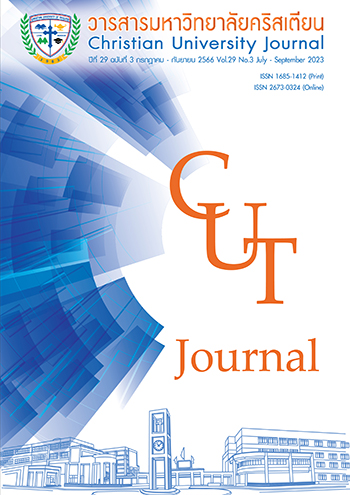องค์ประกอบของความมุ่งมั่นทุ่มเทในงานของพนักงานพิทักษ์ป่าในประเทศไทย
คำสำคัญ:
ความมุ่งมั่นทุ่มเทในงาน, พนักงานพิทักษ์ป่า, พื้นที่คุ้มครองบทคัดย่อ
การวิจัยครั้งนี้มีวัตถุประสงค์เพื่อวิเคราะห์องค์ประกอบของความมุ่งมั่นทุ่มเทในงานของพนักงานพิทักษ์ป่า กลุ่มตัวอย่างในการวิจัย คือ พนักงานพิทักษ์ป่าจำนวน 645 คน โดยวิธีการสุ่มตัวอย่างอย่างง่าย (Simple Random Sampling) เครื่องมือในการวิจัยคือแบบสอบถามมาตรวัด 5 ระดับ ความเชื่อมั่นของเครื่องมือวิจัยแสดงด้วยค่า Cronbach’s Alpha Coefficient (α) เท่ากับ 0.940 สถิติที่ใช้ในการวิเคราะห์ข้อมูลประกอบด้วยค่าร้อยละ การวิเคราะห์องค์ประกอบเชิงสำรวจและเชิงยืนยัน
ผลการวิจัยพบว่า องค์ประกอบของความมุ่งมั่นทุ่มเทในงานของพนักงานพิทักษ์ป่าในประเทศไทย มี 4 องค์ประกอบ รวม 20 ตัวแปร เรียงลำดับความสำคัญตามค่าน้ำหนักองค์ประกอบ ดังนี้ 1) ความภูมิใจในงาน (0.968) มี 7 ตัวแปร 2) บรรยากาศการปฏิบัติงาน (0.894) มี 7 ตัวแปร 3) การรู้คุณค่าของงาน (0.688) มี 3 ตัวแปร และ 4) ความเกื้อกูลของผู้บังคับบัญชา (0.612) มี 3 ตัวแปร ซึ่งผลการตรวจสอบสอดคล้องของโมเดลสมมติฐานกับข้อมูลเชิงประจักษ์ พบว่า มีค่าดัชนีความสอดคล้อง ดังนี้ P-value = 0.000, CMIN/df = 2.805, RMSEA = 0.053, PCLOSE = 0.198, TLI = 0.955, CFI = 0.963, SRMR = 0.0350, GFI = 0.934 และ AGFI = 0.911 ผลการศึกษาครั้งนี้แสดงว่า การบริหารจัดการทรัพยากรบุคคลผู้เป็นพนักงานพิทักษ์ป่าควรให้ความสำคัญต่อการเสริมสร้างความภาคภูมิใจในหน้าที่ การจัดให้สถานที่ทำงานมีบรรยากาศสนับสนุนงาน การทำให้พนักงานพิทักษ์ป่ารู้คุณค่างานของตน และการส่งเสริมให้ผู้บังคับบัญชามีความเกื้อกูลต่อพนักงานพิทักษ์ป่า
เอกสารอ้างอิง
กรมอุทยานแห่งชาติ สัตว์ป่า และพันธุ์พืช. (2562). ข้อมูลสถิติ 2562 กรมอุทยานแห่งชาติ สัตว์ป่า และพันธุ์พืช. สืบค้นจาก http://it2.dnp.go.th/th/statistic-2562
กุลธิดา กรมเวช. (2558). ความมุ่งมั่นทุ่มเทในการทำงานของพนักงาน: ปัจจัยที่เกี่ยวข้องและการพัฒนา. วารสารการพัฒนาทรัพยากรมนุษย์และองค์การ HROD Journal, 7(2), 87-103.
จุฑาจิตร ประดิษฐเจริญ. (2559). บทบาทของอัตลักษณ์องค์การและความมุ่งมั่นทุ่มเทในการทำงานที่มีต่อพฤติกรรมการเป็นสมาชิกที่ดีขององค์การ (วิทยานิพนธ์ปริญญามหาบัณฑิต). สถาบันบัณฑิตพัฒนบริหารศาสตร์, กรุงเทพฯ.
ชุลีรัตน์ จันทร์เชื้อ (2547). การบริหารและการจัดการการท่องเที่ยวเชิงนิเวศ เพื่อการท่องเที่ยวที่ยั่งยืน ในอุทยานแห่งชาติภูหินร่องกล้า (รายงานการวิจัย). พิษณุโลก: คณะวิทยาการจัดการ มหาวิทยาลัยราชภัฏพิบูลสงคราม.
ณัฐพร วิรุฬหการุญ และวาสิตา บุญสาธร. (2560). ความรักและพลังขับเคลื่อนในงานของทายาทธุรกิจครอบครัวขนาดกลางและขนาดย่อม. วารสารพัฒนบริหารศาสตร์, 57(1), 245-276.
เดลินิวส์ ออนไลน์. (2564). 31 ก.ค. วัน จนท.พิทักษ์ป่าโลก “วราวุธ” เชิดชูเกียรติวีรชนพิทักษ์ป่า. สืบค้นจาก www.dailynews.co.th/news/110689
ประวีณา คาไซ และวาสิตา บุญสาธร. (2561). ปัจจัยแห่งความรักและพลังขับเคลื่อนในงานต่อพฤติกรรมสร้างสรรค์นวัตกรรม: กรณีศึกษา โรงแรมขนาดเล็กในประเทศไทย. วารสารวิทยาลัยดุสิตธานี, 12(1), 1-15.
พิมพ์นารา โพธิ์ศรี. (2556). ความสัมพันธ์ระหว่างบุคลิกภาพห้าองค์ประกอบ ความมุ่งมั่นทุ่มเทของพนักงานและคุณภาพการให้บริการของพนักงานฝ่ายขายในกลุ่มธุรกิจค้าปลีกด้านแฟชั่น โดยมีการรับรู้ความสามารถของตนเองเป็นตัวแปรกำกับความสัมพันธ์ระหว่างความมุ่งมั่นทุ่มเทของพนักงานกับคุณภาพการให้บริการ (วิทยานิพนธ์ปริญญามหาบัณฑิต). มหาวิทยาลัยธรรมศาสตร์, กรุงเทพฯ.
สายซอ ลิ้มกุล. (2560). แรงจูงใจในการปฏิบัติงานของพนักงานราชการ ตำแหน่งพิทักษ์ป่า สังกัดสำนักบริหารพื้นที่อนุรักษ์ที่ 2 (ศรีราชา) (วิทยานิพนธ์ปริญญามหาบัณฑิต). มหาวิทยาลัยบูรพา, ชลบุรี.
สายทิพย์ เหล่าทองมีสกุล. (2558). โมเดลสมการโครงสร้างของความมีใจรักงานของครู: การศึกษาเปรียบเทียบความหลากหลายของช่วงวัย. (วิทยานิพนธ์ปริญญาดุษฎีบัณฑิต) มหาวิทยาลัยเทคโนโลยีพระจอมเกล้าพระนครเหนือ, กรุงเทพฯ.
Anagnostou, M., Gunn. V., Nibbs, O., Muntaner, C., & Doberstein, B. (2022). An international scoping review of rangers’ precarious employment conditions. Environment Systems and Decisions, 42, 479-503. https://doi.org/10.1007/s10669-022-09845-3.
Banuelos, A. L., Descals, F. J., & Castano, M. B. (2016). Can we passionate about our work? A review on passion at work. Pepeles del Psicologo/Psychologist Papers, 37(3), 165-169. Retrieved from www.researchgate.net/publication/309430879_Can_we_passionate_ about_our_work_A_review_on_passion_at_work
Hair, J. F., Black, W. C., Babin, B. J., & Anderson, R. E. (2010). Multivariate data analysis. (7th ed.). New York: Pearson.
Ho, V. T., & Astakhova, M. N. (2020). The passion bug: How and when do leaders inspire work passion? Journal of Organizational Behavior, 41, 424-44. Retrieved from https://doi.org/10.1002/job.2443.
Houlfort, N., Phillippe, L. F., Vallerand, R., & Menard, J. (2013). On passion and heavy work investment: Personal and organizational outcomes. Journal of Managerial Psychology, 29(1), 25-45. https://doi:10.1108/JMP-06-2013-0155.
Kula, S., & Guler, A. (2014). Influence of supervisor support on job satisfaction levels: An evaluation of Turkish National Police (TNP) Officers in the Istanbul Police Department. International Journal of Criminal Justice Sciences, 9(2), 209-224.
MacCallum, R. C., Widaman, F. K., Zhang, S., & Hong, S. (1999). Sample size in factor analysis. Psychological Method Journal, 4(1), 84-99. Retrieved from DOI: 10.1037/1082-989X.4.1.84.
Moreto, W. D., Lemieux, A. M., & Nobles, M. (2017). Occupational motivation and intergenerational linkages of rangers in Asia. Retrieved from https://doi:10.1017/S0030605317001041.
Nerowski, T. C. (2018). Mediation effects between person-environment fit and burnout among special education teachers (Doctoral Dissertation). Northcentral University, San Diego, California. (UMI No. 10980208)
Permarupan, Y., Al-Mamun, A., Saufi, A. R., & Zainol, N. R. (2013). Organizational climate on employee’s work passion: A review. Canadian Social Science, 9(4), 63-68. https://doi:10.3968/j.css.1923669720130904.2612.
Purba, S. D., & Ananta, A. N. D. (2018). The effects of work passion, Work engagement and job satisfaction on turn over intention of the millennial generation. Jurnal Manajemen Dan Pemasara Jasa, 11(2), 263-274. https://doi:10.25105/jmpj.v11i2.2954.
Salessi, S., Omar, A., & Vaamonde, J. D. (2017). Conceptual considerations of work passion. Ciencias Psicologicas, 11(2), 165-178. https://doi.org/10.22235/ep.v11i2.1488.
Serrano-Fernandez, M. J., Boada-Grau, J., Gil-Ripoll, C., & Vigil-Colet, A. (2019). A predictive study of antecedent variables of Passion towards Work. Journal of Annals of Psychology, 35(3), 490-495. https://doi.org/10.6018/analesps.35.3.331091.
Singh, R., Galliers, C., Appleton, M., Hoffmann, M., Long, B., Cary-Elwes, J., Fritze, C., ... Jones, P. R. (2021). The vital role of rangers in conservation. Parks Stewardship Forum, 37(1), 128-136. https://doi:10.5070/P537151745.
Spira, C., Kirkby, E. A., & Plumptre, J. A. (2019). Understanding ranger motivation and job satisfaction to improve wildlife protection in Kahuzi-Biega National Park, Eastern Democratic Republic of the Congo. Oryx, 53(3), 460-468. https://doi:10.1017/S0030605318000856.
Yukhymenko-Lescroart, M. A., & Sharma, G. (2018). The relationship between faculty member’s passion for work and well-being. Journal of Happiness Studies, 20(3), 863-881. https://doi.org/10.1007/s10902-018-9977-z.
Zigarmi, D, Nimon, K., Houson, D., Witt, D., & Diehl, J. (2009). Beyond engagement: Toward a framework and operational definition for employee work passion. Human Resource Development Review, 8(3), 300-326. https://doi:10.1177/1534484309338171.
Zigarmi, D., & Nimon, K. (2011). A cognitive approach to work intention: The stuff that employee work passion is made of?. Advance in Developing Human Resources, 13(4), 447-461. DOI: 10.1177/1523422311431152.
ดาวน์โหลด
เผยแพร่แล้ว
ฉบับ
ประเภทบทความ
สัญญาอนุญาต
ลิขสิทธิ์ (c) 2023 มหาวิทยาลัยคริสเตียน

อนุญาตภายใต้เงื่อนไข Creative Commons Attribution-NonCommercial-NoDerivatives 4.0 International License.



